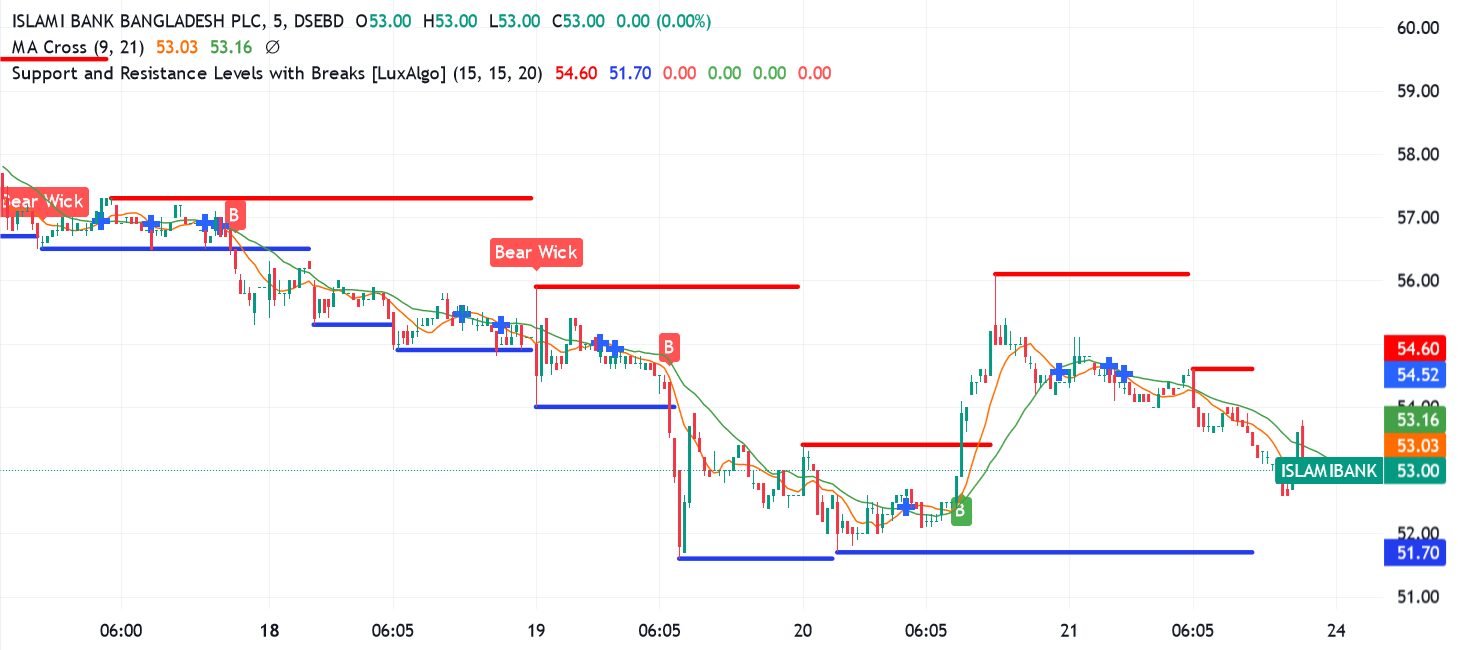CFD Trading In Bangladesh



Contracts for difference (CFDs) are complex financial instruments that can be used to trade a broad spectrum of asset classes.
In Bangladesh, trading volumes of these derivative products are rising sharply as the country’s economy grows and interest in financial markets picks up.
This guide will help beginners start CFD trading in Bangladesh. It’ll reveal the different financial markets these securities can be used to trade, talk about the regulatory protections that investors can expect, and explain what taxes traders may have to pay.
It’ll also show you how a CFD trade involving a large Bangladeshi bank may transpire.
Quick Introduction
- CFD traders in Bangladesh can trade popular asset classes including forex, shares and commodities, although cryptocurrency-based contracts are illegal.
- As with other derivatives, traders tend to use leverage (or borrowed money) from their broker. This high-risk tactic means they often follow strict risk management rules.
- CFD trading is regulated by the Bangladesh Securities and Exchange Commission (BSEC), although traders can potentially enjoy better protection by using a broker approved by a respected overseas regulator.
- CFD traders may need to pay a progressive rate of personal income tax of between 0% and 25% on their earnings, or 30% if they are non-residents, to the National Board of Revenue (NBR).
Best CFD Brokers In Bangladesh
Through extensive tests, we've identified these 4 CFD providers as the best for traders in Bangladesh:
How Does CFD Trading Work?
CFDs are a form of derivative, which means traders can bet on the price movement of an underlying financial asset without the burden of ownership. This can have numerous advantages, including the potential for cheaper and simpler trades.
These contracts can be used to bet on a wide variety of markets including equities, forex, commodities and bonds.
One potential downside is that they are traded over the counter rather than on a regulated exchange, which means that traders are exposed to counterparty risk.
CFD trading tends to involve the use of borrowed funds, also known as leverage.
Using money lent by a broker is a high-risk, high-return strategy that allows traders to open a larger position than they’d otherwise be able to. An individual simply needs to put down margin, which is a small percentage of the total trade value.
Here’s how it works…
Let’s say I want to make money by trading the Dhaka Stock Exchange Broad Index (DSEX). This is Bangladesh’s flagship share index, comprising more than 250 companies spanning a multitude of sectors.
If I think the DSEX will gain value, I’ll purchase a CFD that’s linked to the index. If each contract trades at 5,200, and my broker demands a 15% margin, I’ll need to deposit 7,800 Bangladeshi Taka (BDT) to purchase 10 contracts (5,200 per contract x 10 contracts x 15%).
Now we’ll assume the DSEX ascends to 5,300, earning me BDT 100 for each contract I purchased. I’d make a total profit of BDT 1,000 upon exiting my position (10 contracts x BDT 100 per contract).
But what would have happened if the DSEX dropped to 5,100? In this scenario I’d have made a loss of 100 per contract instead, giving me a total loss of BDT 1,000.
Here you can see the extra dangers that leverage traders take on board. Risk-averse traders should therefore consider using just their own funds, or to only borrow small sums from their broker if they absolutely must use leverage.
What Can I Trade With CFDs?
Traders can bet on whether prices will appreciate or depreciate across several financial markets. The range of instruments will depend on the broker you use, but they may include:
- Stock CFDs: Traders in Bangladesh could trade local equities such as telecoms provider Grameenphone, drugmaker Square Pharmaceuticals and white goods manufacturer Walton Hi-Tech Industries. However, they may prefer to trade contacts linked to major shares in North America, Europe or Asia due to their superior liquidity and wider availability.
- Index CFDs: Contracts may be available on domestic indices like the DSEX, as well as popular international indexes like the FTSE 100 and the S&P 500.
- Forex CFDs: Traders could bet on whether the taka will rise or fall against a range of other currencies. Available pairings include the BDT/USD (versus the US dollar) and the BDT/EUR (versus the euro), although short-term traders tend to focus on more liquid major pairs (like the EUR/USD and GBP/USD combinations).
- Commodity CFDs: Derivatives are not commonly available for Bangladesh’s main exports like rice, jute and tea. So local traders tend to deal in other commodity-linked CFDs (such as coffee, gold and oil).
Traders in Bangladesh are unable to buy and sell cryptocurrency CFDs. This follows the banning of digital counters like Bitcoin and Ethereum back in 2017.
Is CFD Trading Legal In Bangladesh?
Yes. The Bangladesh Securities and Exchange Commission (BSEC) is charged with regulating and supervising the country’s financial markets, and for carrying out enforcement action where necessary. Its remit includes covering the CFD sector.
The BSEC was established in the early 1990s. It describes its broad responsibility as “protecting the interest of investors in securities, developing the securities market and promulgating rules on these issues.”
Under DayTrading.com’s Regulation & Trust Rating, the BSEC is classified as an ‘orange tier’ regulator. This means that individuals receive some safeguards from fraudulent parties, although the protection they enjoy is somewhat limited.
I think that Bangladesh’s traders should therefore choose a brokerage approved by a ‘green tier’ or ‘yellow tier’ regulator (such as the UK’s Financial Conduct Authority (FCA) or Switzerland’s Swiss Financial Market Supervisory Authority (FINMA)).
Is CFD Trading Taxed In Bangladesh?
Yes. Active CFD traders may be required to pay personal income tax on their earnings. This is charged at the following progressive rates for residents:
| Taxable Income | Tax Rate |
|---|---|
| Up to BDT 300,000 | 0% |
| Next BDT 100,000 | 5% |
| Next BDT 300,000 | 10% |
| Next BDT 400,000 | 15% |
| Next BDT 500,000 | 20% |
| Any amount above BDT 1,600,000 | 25% |
Non-residents in Bangladesh pay PIT at a flat rate of 30%.
A CFD Trade In Action
Now you know the basics, you’re ready to start trading these derivative instruments. Here’s an example of how trading Islami Bank might happen in the real world.
The Background
My strategy was to buy an Islami Bank CFD before the Bangladesh Bank made its next interest rate statement.
I expected the central bank to raise interest rates by half of a percentage point, to 10%. This is above the 9.75% interest rate that the broader market was expecting.
Higher rates are beneficial to banks’ net interest margins (NIM). As a consequence, I expected Islami Bank’s share price – and by extension, the value of my CFD – to rise if my prediction is correct. At this point I’d sell my contract for hopefully a tasty profit.
I come to my 10% estimate after studying recent economic data. This includes monthly inflation data that indicates stubbornly high consumer price inflation (CPI), and latest quarterly GDP figures showing weak economic growth.
I don’t stop my research here, however. I also carry out technical analysis to help me understand where Islami Bank shares could be heading, and to identify possible entry and exit positions for my trade.

The Trade
I opened my trading platform around 15 minutes before the Bangladesh Bank was due to make its interest rate announcement. This gave me plenty of time to key in both parts of my trade: a take profit order and a stop loss instruction.
At this time, Islami Bank CFDs were trading at BDT 54.72. My plan was to purchase 1,000 contracts using margin of 15%. So I deposited 8,208 in my trading account (54.72 per contract x 1,000 contracts x 15%).
Next, I placed a take profit order at BDT 55.24 and a stop loss order at BDT 54.39. These devices worked by closing my trade when the contract rises to the former level or falls to the latter, whichever occurs first.
As a consequence, they enable me to manage risk, by either booking my profits before the market has a chance to retrace, or by limiting any losses I could incur.
Within half an hour of placing my trades, Bangladesh Bank announced it raised interest rates to 10%, as I’d expected. My Islami Bank CFD rises afterwards, and after another 15 minutes my take profit instruction at BDT 55.24 is automatically triggered.
The trade gives me a total profit of BDT 520 (BDT 55.24 – BDT 54.72 x 1,000 contracts).
Bottom Line
Traders in Bangladesh can trade a number of financial markets via CFDs. And they can do so with brokers that offer leverage to try and pump up their returns.
However, it’s crucial to remember that borrowing money to trade can also exacerbate losses if the market moves in the ‘wrong’ direction.
Individuals only receive limited levels of protection from the local regulator. So they should choose a brokerage that’s authorized to deal by a reputable body in another region.
To begin CFD trading in Bangladesh, take a look at DayTrading.com’s choice of the best CFD trading platforms.
Recommended Reading
Article Sources
- Economy of Bangladesh - Britannica
- Dhaka Stock Exchange (DSE)
- Chittagong Stock Exchange (CSE)
- Dhaka Stock Exchange Broad Index (DSEX)
- Bangladesh Securities and Exchange Commission (BSEC)
- Tax rates in Bangladesh – Standard Bank
- National Board of Revenue (NBR)
- Bangladesh Bank
The writing and editorial team at DayTrading.com use credible sources to support their work. These include government agencies, white papers, research institutes, and engagement with industry professionals. Content is written free from bias and is fact-checked where appropriate. Learn more about why you can trust DayTrading.com



